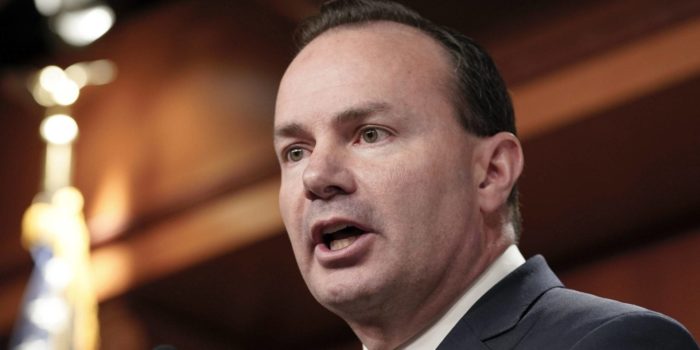(José Niño, Headline USA) A Utah senator’s plan to sell millions of acres of western public lands has united an unlikely coalition of conservative environmentalists, Trump administration veterans, and Democratic lawmakers in fierce opposition to what they view as an unprecedented threat to America’s natural heritage.
In the middle of this month, Sen. Mike Lee, R-Utah, put forward a proposal as part of the Senate’s budget reconciliation bill, which would mandate the Bureau of Land Management and U.S. Forest Service to sell between 2 and 3 million acres of federal land over five years in 11 western states, including Utah, Idaho, Colorado, and California.
The stated goal is to address housing affordability by making “underused” federal lands available for development.
The Senate bill does not authorize the sale of national parks, monuments, or wilderness.
It identifies unused, garden-variety federal parcels for potential disposal—nothing more.
Don’t fall for Tracy @StoneManning’s disinformation campaign.@RepHageman sets the record straight…
— Mike Lee (@SenMikeLee) June 19, 2025
Lee, who chairs the Senate Energy and Natural Resources Committee, has positioned the plan as a solution to both the housing crisis and local economic development. “We’re opening underused federal land to expand housing, support local development and get Washington, D.C., out of the way for communities that are just trying to grow,” Lee said in a video announcing the bill.
He has repeatedly emphasized that the proposal would allegedly exclude national parks, monuments, and designated wilderness areas, focusing instead on other federal holdings.
The controversy erupted when the legislative language was released last Wednesday after weeks of secrecy.
The scale of the plan, which could make more than 250 million acres eligible for nomination according to The Wilderness Society, shocked conservationists and outdoor groups.
Critics argue the bill would carry out the largest public land sell-off in U.S. history, with little guarantee that the land would actually be used for affordable housing. There are also concerns about the loss of public access to cherished recreation areas and the potential for sales to private interests, including mining and energy companies.
Opposition has been swift and unusually bipartisan, uniting environmentalists, Democrats, and prominent conservatives.
Benji Backer, founder of the conservative environmental group Nature Is Nonpartisan, called Lee a “liar” and accused him of jeopardizing America’s conservation legacy.
Christopher Rufo, a high-profile conservationist activist and senior fellow at the Manhattan Institute, stated that he is “totally opposed” to mass sales of western public lands.
Rep. Ryan Zinke, R-MT, former Trump Interior Secretary, who led efforts to strip a similar provision from the House bill, declared, “It’s a no now. It will be a no later. It will be a no forever.”
You could sell all 640M acres of federal land and it would raise less than half what the federal government spends each and every year.
Don’t let Mike Lee sell off your American birthright for six months of government spending. https://t.co/KtvuuRfreq pic.twitter.com/Y6AyxfuZjg
— Robert Sterling (@RobertMSterling) June 19, 2025
Jeff Crane, the president of the Congressional Sportsmen’s Foundation, warned that public lands are a vital part of America’s heritage and should not be sold off through a rushed budget process. “While we are not opposed to the sale of public lands in principle, we do not support the sale of lands through budget reconciliation as there are existing processes in place that we need to leverage to address challenges facing local communities,” Crane said.
Sen. Martin Heinrich, D-NM, the ranking Democrat on the Energy Committee, questioned whether the plan would actually deliver housing and warned of lost public access. He stated, “I don’t think it’s clear that we would even get substantial housing as a result of this. What I know would happen is people would lose access to places they know and care about and that drive our Western economies.”
The backlash has also included nearly 150 conservation and outdoor organizations, who argue the measure would undermine environmental protections and public trust.
José Niño is the deputy editor of Headline USA. Follow him at x.com/JoseAlNino

